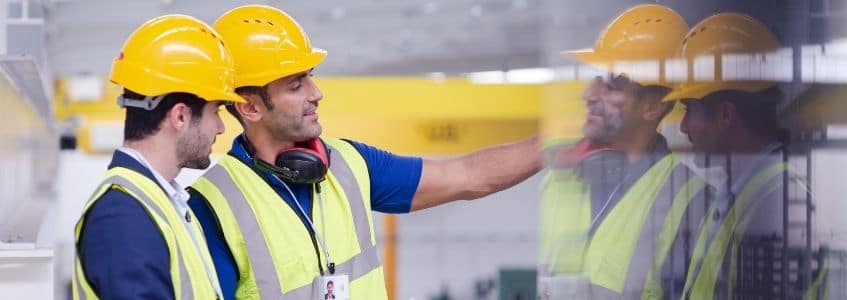Non-compliance with safety regulations can result in serious consequences, such as fines, legal action, project delays, increased insurance premiums, and damage to a company's reputation. More importantly, it can lead to accidents and injuries, which can result in physical harm, lost productivity, and increased costs for medical treatment and workers' compensation. It can be helpful to know what non- compliance means and what measures can be taken to remain in compliance.
What is Safety Regulation Non-Compliance?
Being non-compliant with safety regulations in the construction industry means that a construction business or project is not meeting the required standards for safety as set out by the relevant authorities, such as government agencies, industry organizations, or insurance companies.
Examples of Safety Non-Compliance
- Failure to provide and enforce the use of personal protective equipment (PPE), such as hard hats, safety glasses, gloves, and boots.
- Failure to properly maintain equipment, tools, and machinery, which can lead to accidents and injuries.
- Failure to conduct regular safety inspections or to address identified hazards in a timely manner.
- Failure to provide adequate safety training for workers.
- Failure to comply with building codes, zoning laws, or environmental regulations.
- Failure to obtain necessary permits or licenses.
- Failure to properly secure the construction site, which can lead to unauthorized access and accidents.
Who Determines Worksite Safety Requirements & Regulations
Industrial site safety requirements and regulations are typically determined by government agencies and industry organizations at the local, state, and national levels. These organizations set standards and regulations to ensure that industrial work is conducted safely and to protect workers and the public from harm.
Organizations that establish industrial site safety requirements and regulations include:
- Occupational Safety and Health Administration (OSHA): OSHA is a federal agency that sets and enforces safety standards for workplaces, including construction sites.
- National Institute for Occupational Safety and Health (NIOSH): NIOSH is a federal agency that conducts research and provides recommendations to prevent work-related injuries, illnesses, and deaths.
- American National Standards Institute (ANSI): ANSI is a non-profit organization that develops standards for a variety of industries, including construction.
- National Fire Protection Association (NFPA): NFPA is a non-profit organization that develops and publishes codes and standards for fire safety.
- International Code Council (ICC): ICC is an organization that develops and publishes building codes and standards that are adopted by many jurisdictions in the United States.
Contractor and supplier management service companies will also have specific safety requirements that are necessary for their compliance. Some of these contractor and supplier management service companies include: ISNetworld®, Avetta®, PEC Safety®, Veriforce® and BROWZ®.
Consequences of Non-Compliance with Safety Regulations
The consequences of non-compliance with safety regulations in the construction industry can be serious and wide-ranging, including:
- Fines and penalties: Non-compliance can result in fines and penalties levied by government agencies or industry organizations. These fines can be substantial, and repeated violations can lead to even higher penalties.
- Legal action: Non-compliance can also result in legal action, such as lawsuits brought by injured workers or members of the public who have been harmed due to unsafe conditions. Legal action can result in significant financial costs and damage to a company's reputation.
- Project Delays and Stop-Work Orders: Non-compliance can result in project delays or stop-work orders issued by government agencies or industry organizations until safety violations are addressed. These delays can be costly and can affect a company's ability to meet project deadlines.
- Increased Insurance Premiums: Non-compliance can result in increased insurance premiums, as insurance companies may view non-compliant companies as higher risk.
- Loss of Business: Non-compliance can result in the loss of business, as clients may not want to work with companies that do not prioritize safety.
- Injuries and Fatalities: The most serious consequence of non-compliance is the potential for injuries or fatalities. Unsafe conditions can lead to accidents and injuries that can cause physical harm and emotional trauma, as well as lost productivity and increased costs for medical treatment and workers' compensation.
Ways to Stay Compliant with Safety Regulations
There are several ways that construction companies can help themselves stay compliant with safety regulations:
- Comprehensive Safety Programs: Companies should develop a comprehensive safety program that outlines the specific safety requirements for their business, including job site hazard assessments, safety training programs, and regular safety audits.
- Conduct Regular Safety Inspections: Regular safety inspections should be conducted to identify potential hazards and ensure compliance with safety regulations. These inspections should be documented, and any identified hazards should be addressed promptly.
- Provide Safety Training: Companies should provide safety training to all employees to ensure that they understand the safety requirements and know how to identify and respond to potential hazards. Training should be ongoing to incorporate any updates or changes made to safety protocols.
- Enforce Safety Policies and Procedures: Companies should have clear safety policies and procedures and enforce them consistently. This includes enforcing the use of personal protective equipment (PPE), conducting safety meetings, and enforcing disciplinary action for safety violations.
- Stay Up-to-Date on Safety Regulations: Companies should stay informed about changes in safety regulations and ensure that they are compliant with all applicable regulations.
- Hire Safety Compliance Professionals: Companies can hire safety compliance professionals, such as safety managers or safety consultants, to help develop and implement their safety programs and ensure compliance with safety regulations.
Avoid the negative consequences of non-compliance on construction worksites by working with experienced safety compliance consultants. Safety compliance consultants can leverage their knowledge and expertise to help you create safety programs, obtain compliance and maintain that compliance for your industrial business. Learn more about how Industrial Compliance & Safety can help you avoid the risks and dangers of non-compliance with a free safety compliance consultation. We are expert consultants for ISNetworld®, Avetta®, PEC Safety®, BROWZ®, and many others! Call us today at (855) 908-3386.
Ready To Get Compliant Today?
Call us or complete the form below!





